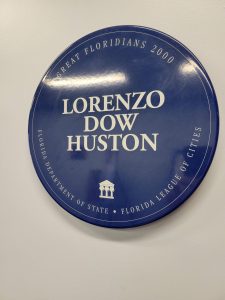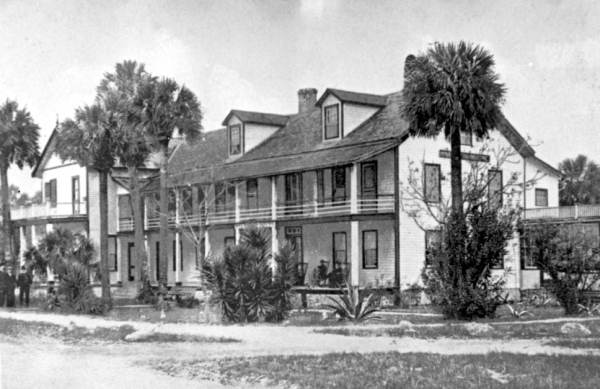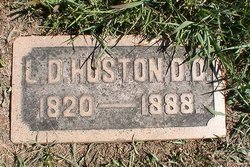For a better future, study the past.
For a better future, study the past.
The Great Floridians 2000 program was designed to recognize individuals who distinguished themselves through their philanthropy, public service or personal or professional service, and who have enhanced the lives of Florida’s citizens.
Anyone could nominate an individual to be designated a Great Floridian 2000 by submitting a Great Floridians 2000 application. These applications were periodically reviewed by the appointed Great Floridians 2000 Committee, a group of seven distinguished historians from throughout Florida.
The program, begun in 1998, was completed in 2000.
The distinctive blue plaques honoring the men and women in the program are attached to buildings or structures in the cities where the designee left their mark. No biographical information is included on the plaques.
The short biography below is the official biography published as part of the Great Floridians 2000 program.

Lorenzo Dow Huston was born in 1820 in Cincinnati, Ohio. He was admitted to the Kentucky Conference as a Methodist minister and was a journalist and editor of the Christian Advocate in Nashville, Tennessee before the Civil War. In 1874 he retired from the ministry and with his family settled in Daytona at the Palmetto House. Mary Huston Hoag, Huston’s sister, had bought the Palmetto House in 1874.
Dr. Huston was appointed Daytona’s first mayor in 1876, served as a justice of the peace, and was Volusia County Superintendent of the Public Schools. He served as a county commissioner and in 1887 was appointed by Governor Perry to the State Railroad Commission.* That same year he and his wife Maria died of yellow fever within a few days of each other.
Huston’s Great Floridian plaque is located at the Volusia County Library Center, 105 East Magnolia Avenue, Daytona Beach.
*Editorial Comment–The governor of Florida in 1887 was Edward Alysworth Perry, not to be confused with Madison Starke Perry who served as governor from 1857-1861.
**Thank you to librarian Kim Dolce for letting me know this marker is located inside City Island Library.

___________________________________________________________________________________________________
Below, is a small bit of additional research into the life of Huston. It might call into question his inclusion as a “Great Floridian.” I have not delved deeply into the life of Huston, or his political activities in Volusia County, but he does seem to have a problematic history that the author of the above biographical short either was unaware of or purposefully ignored.
Before arriving in Daytona Beach, Reverend Dow ran afoul with the law, and prior to that, United States military forces.
The Adams Sentinel reported on October 10, 1865, that Huston had been arrested by the order of General James Sanks Brisbin after complaints from a local congregation. Huston was described as having “attempted to force himself upon a local congregation against their will.” The arrest order called Huston a “notorious Rebel preacher.”
The “notorious rebel” line could make sense. The 1860 United States Slave Census shows a Lorenzo Huston, living in Tennessee, owning a single female slave, age 26. When cross referenced with the 1860 United States Census, this same Lorenzo is listed as married to Maria and is shown as being employed in “Methodist Clergy” with real estate valued at $4,000 and a personal estate of $6,000.
A New York Times article dated June 17, 1872, reprinted from the Baltimore Sun dated June 15, 1872, ran under the headline “Indictment of Rev. Dr. Huston for Adultery—Curious Provisions of the Maryland Law.”
Reverend Huston was accused of committing adultery with a “Sunday School girl” by the name of Mary Driscoll in January 1872.
For a full history of this event, it is recommended that readers read the following article.
Curtis, Peter H. “A Scandal in Baltimore: The Trials of the Reverend Lorenzo Dow Huston, 1872-1873.” Maryland Historical Review. Vol. 105: No. 3 (Fall 2010) 227-242.
This scholarly article may be referenced using THIS LINK.
Reverend Huston was to later write his own account, which may be purchased using THIS LINK. The Volusia County library system does not hold this title. They do, however, hold non-circulating copies of All We Have to Fear is the Lonesome: The Letters of L.D. Huston from Pre-Civil War Days Through his Relocation to the Florida Frontier in 1874, edited by Maria M. Clifton. CLICK HERE for library holdings.

An online memorial to Huston may be found using THIS LINK.
Additional posts from the Great Floridians 2000 series may be found by using THIS LINK.
